This post may contain affiliate sales links. Please read my disclosure policy.
Do you feel like everyone around you is sick right now? Me too! We are in need of some immunity boosting magic! Enter: my homemade Fire Cider Recipe! Fire cider is a traditional herbal remedy that is made by infusing various fruits, vegetables, herbs, spices, and other ingredients in vinegar and is believed to have immune-boosting and health-promoting super powers! Sign me up!
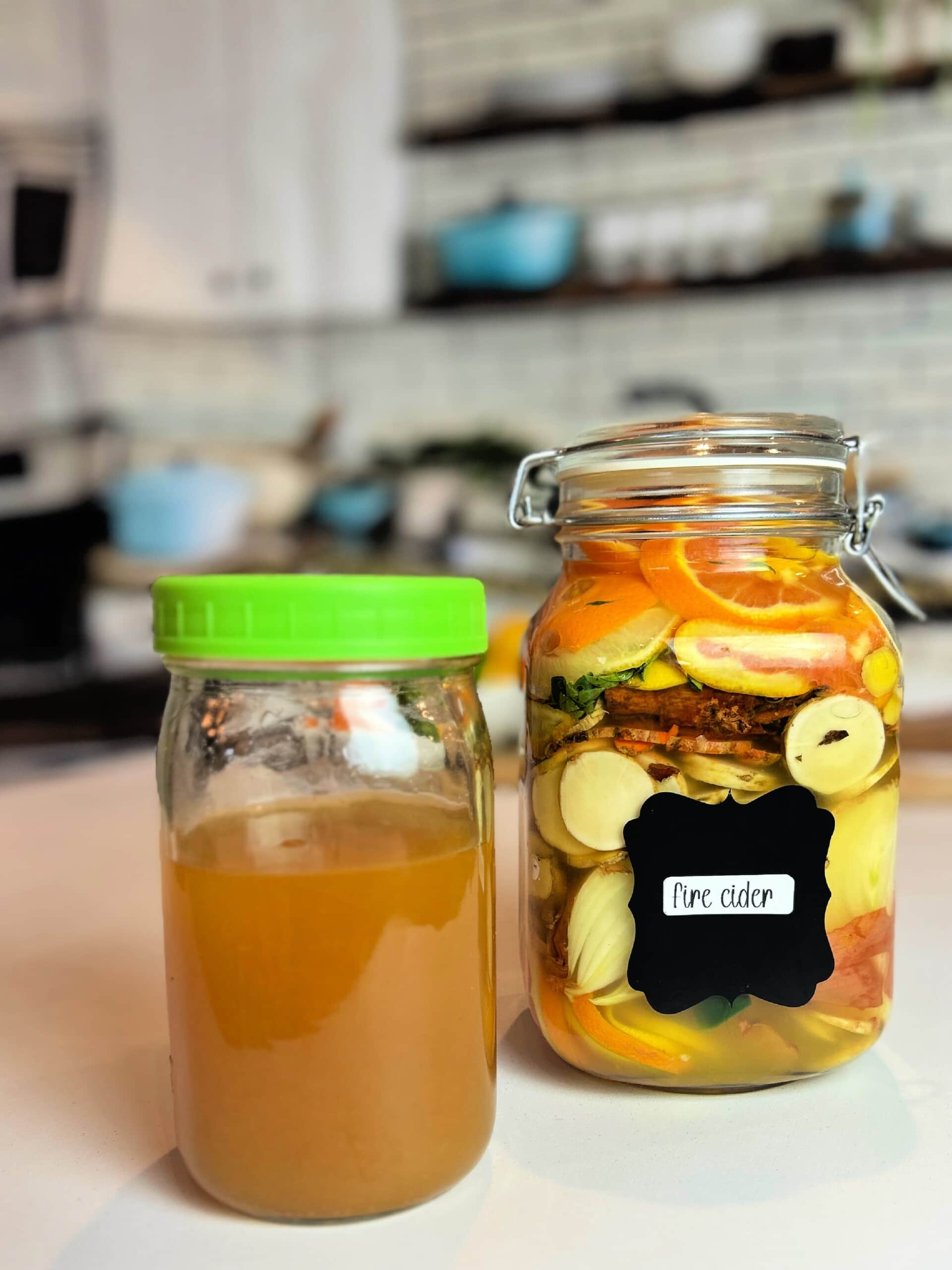
What is Fire Cider and Why You’ll Love It
Fire Cider is a popular herbal tonic that has gained a devoted following for its potential health benefits and unique flavor profile. It is thought to be originally created as an herbal medicine by the renowned herbalist Rosemary Gladstar, so credit where credit is due. Reasons for its popularity include its immune-boosting ingredients, digestive support, anti-inflammatory properties, energizing effects and more, especially during the winter months. I’m not exactly sure of the original recipe but I have done my best to pack this one full of ingredients that I know have amazing immune-boosting benefits, which is the whole point. 🙂
While some people have grown to actually love the taste, I’m definitely not one of them yet. It’s not the tastiest item on the menu…but let’s be honest, neither is medicine amiright? When you think about all of the benefits of drinking it every day, it makes it so much easier to put away down the old hatch! I’m finding lots of new ways to incorporate into my life and it’s become fun! Keep reading for some of my ideas on how to get this liquid GOLD into my body every day. But first…
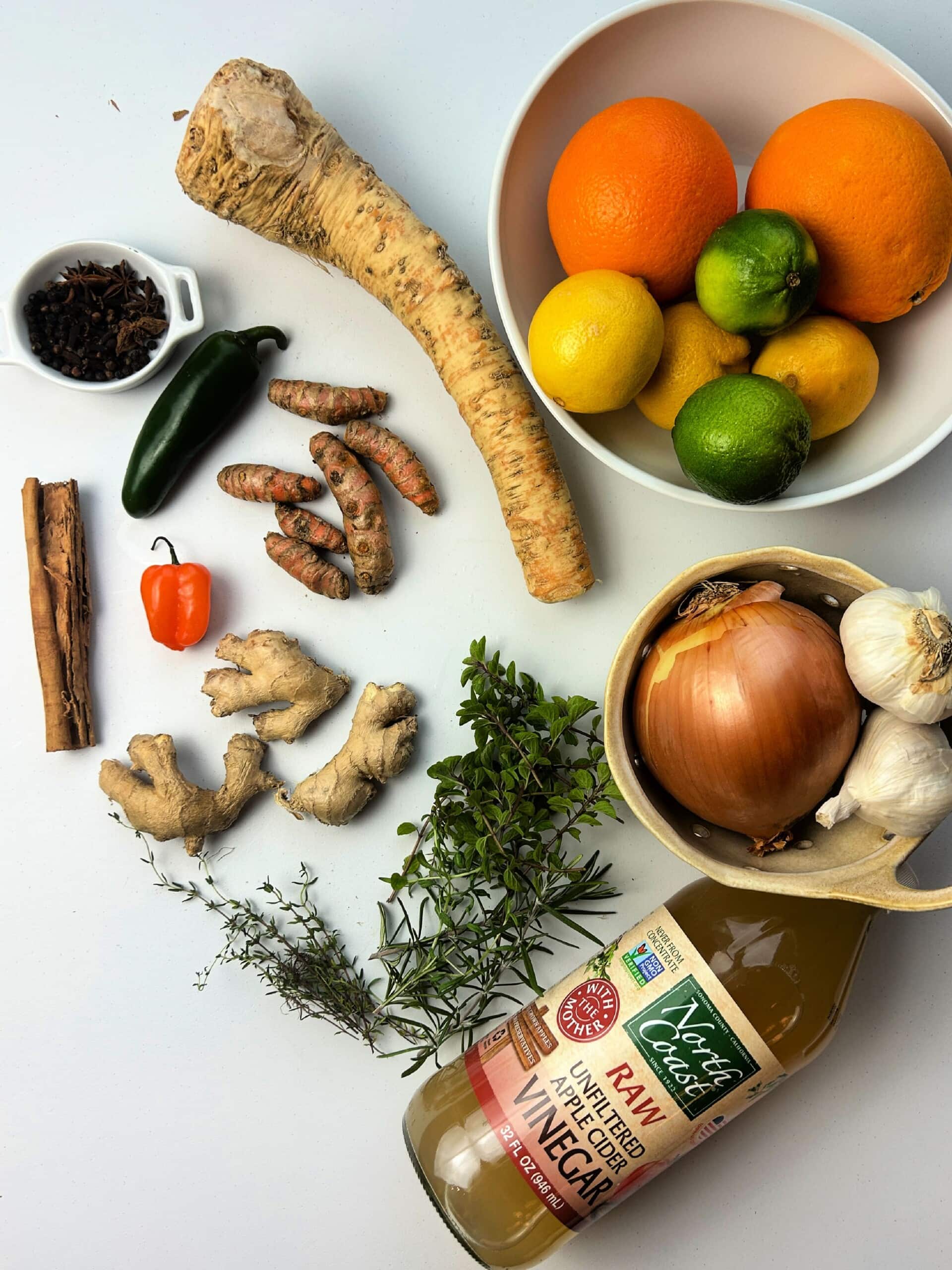
Ingredients and Health Benefits of Fire Cider
- fresh ginger root – anti-inflammatory properties + immune system support due to being rich in antioxidants
- fresh turmeric root – contains curcumin, a compound with strong anti-inflammatory and antioxidant effects, which may help reduce inflammation and oxidative stress
- fresh horseradish root – decongestant properties + antibacterial and antimicrobial effects, contributing to its potential for immune system support
- lime – rich in Vitamin C + antioxidants to help neutralize free radicals in the body, reducing oxidative stress + have an alkalizing effect in the body, potentially supporting a balanced pH.
- lemons – rich in Vitamin C, promoting immune system health + have an alkalizing effect like limes + , the acidity of lemons may stimulate the production of digestive enzymes, aiding in digestion.
- orange – rich in Vitamin C + various antioxidants that help combat oxidative stress in the body + a good source of dietary fiber
- onion – contain compounds with anti-inflammatory effects + immune-boosting properties + promote healthy blood circulation
- garlic – well-known for its immune-boosting properties, helping the body defend against infections + may lower blood pressure and cholesterol levels + antioxidant properties
- hot peppers (like jalapeno and habanero, or cayenne pepper) – contain capsaicin, which may boost metabolism and contribute to weight management and provide relief from pain + anti-inflammatory effects
- fresh medicinal herbs (like rosemary, thyme, and oregano) – rich in antioxidants + have natural antimicrobial properties
- whole spices (like star anise, black peppercorns, cinnamon sticks and clove) – antioxidant properties + anti-inflammatory effects. Black pepper enhances the absorption of curcumin, the active compound in turmeric.
- raw apple cider vinegar (with the Mother) – promotes the production of digestive enzymes and maintaining a healthy pH balance + may help regulate blood sugar levels
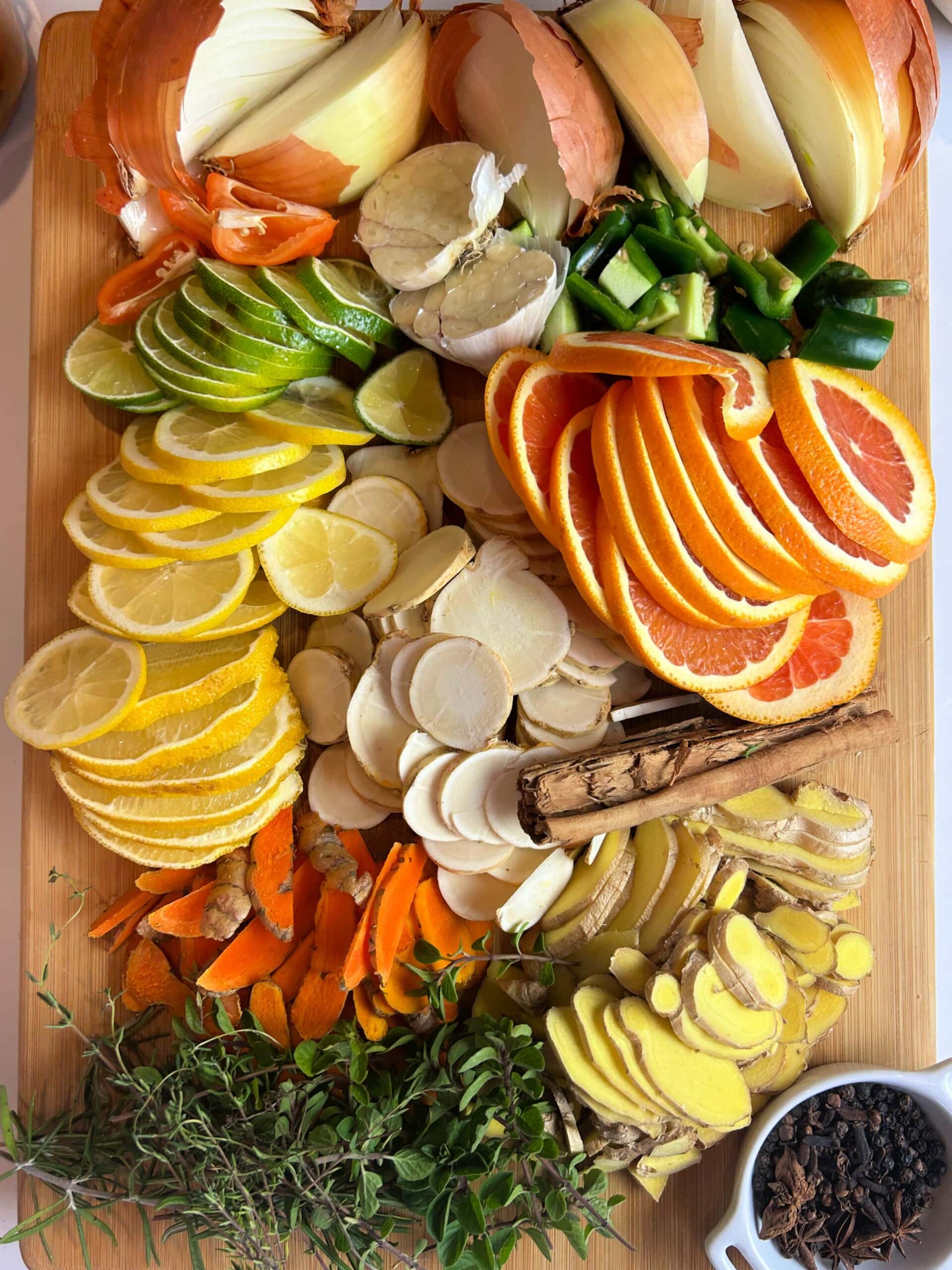
How To Make This Traditional Fire Cider Recipe
Although this recipe for traditional Fire Cider takes at least month to infuse (and ferment) before it’s ready to use, it couldn’t be easier to put together. I like to plan ahead so that I always have a batch in the works, ready and waiting for its turn to step up and ward off the bad guys.
For full recipe details including ingredients and measurements, see the printable recipe card down below. I suggest using all organic ingredients if possible. Here is step by step what to expect when making your own fire cider:
Start With a Very Clean Jar
Start with a very clean 32 oz mason jar with a rubber or plastic lid. Alternatively you can use 2 quart size jars or 4 pint size jars. I like to put mine in the dishwasher to ensure they are completely disinfected.
Slice Fruit and Vegetables
Slice or chop all fruits and vegetables (ginger, turmeric, horseradish, onion, garlic, lemon, lime, orange). there is no need to peel any of these ingredients as they will be getting strained at the end. Plus, the peels have their own health benefits! We want those in there too!
Pack Jar
Place all fruits, vegetables, herbs and spices into the jar, packing down to make sure there are no very few gaps.
Pro Tip: The amounts of each ingredient can be found in the recipe card below but keep in mind that you can mix and match these according to what you have on hand. The important part is to fill your jar to the top. This is also a great way to use up some leftover onions, garlic or citrus that may be going bad soon, so definitely make it your own!
Add Vinegar + Seal
Once jar is completely full to the top (you may need to add more fruit, onion or garlic), pour in the apple cider vinegar until it reaches the top of the jar and covers all ingredients, about 3 cups. Seal the jar tightly with a rubber or plastic lid.
Pro Tip: If you are using a metal lid, place a piece of parchment paper or plastic wrap over the jar opening to prevent the vinegar from corroding the metal.
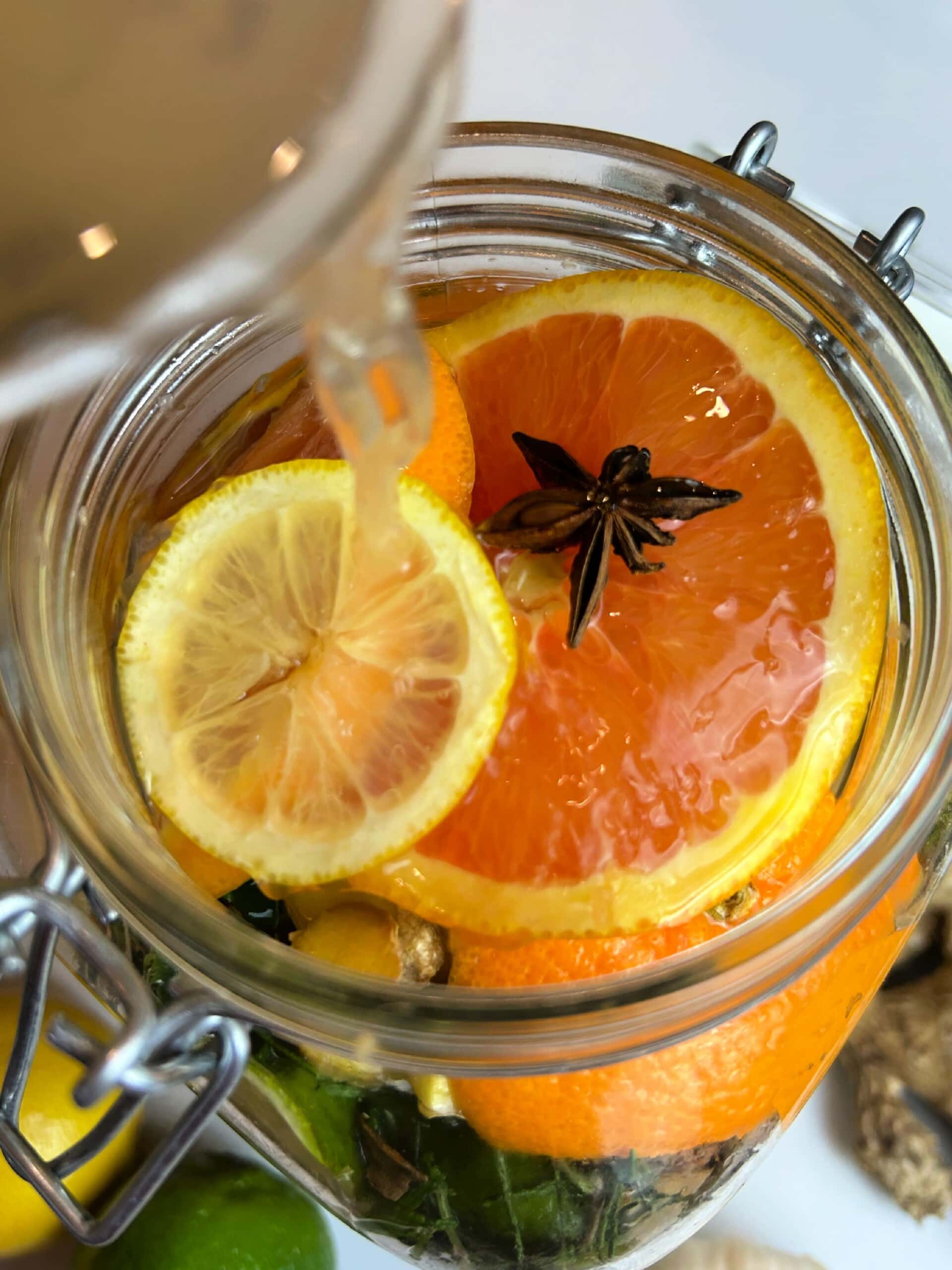
Shake + Store
Shake the jar well to mix the ingredients. Store the jar in a cool, dark place for about 4-6 weeks. Remember to shake the jar every day to encourage the infusion of flavors.
Strain + Refrigerate
After the fermentation period, strain the liquid through a fine mesh strainer or cheesecloth into a clean bowl or another jar, separating the liquid from the solids. Discard the solids (or use in a stir fry, if desired). Store in tightly sealed jars or airtight containers in the refrigerator.
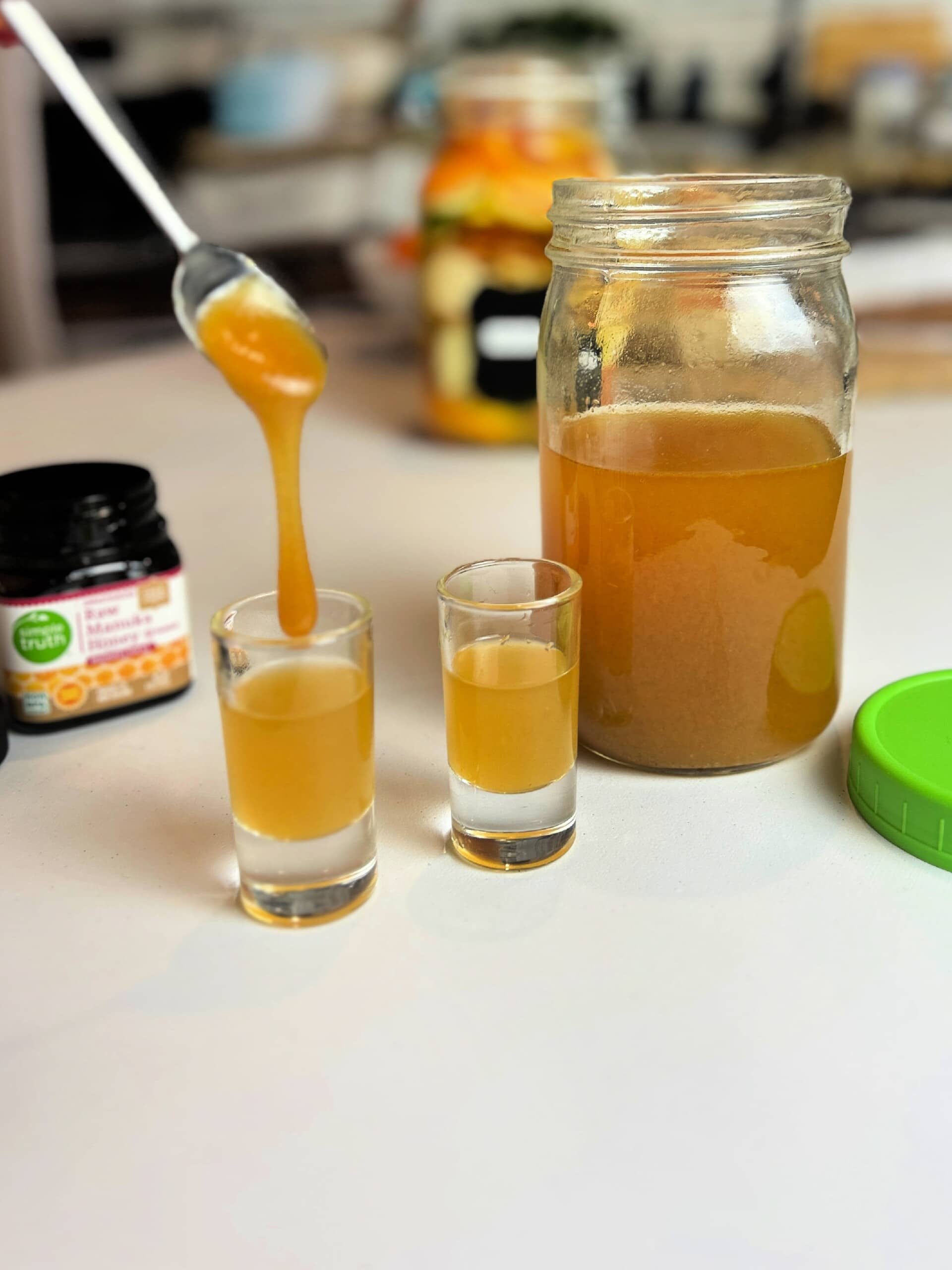
How to Serve Fire Cider
#1: Honey – Fire cider is best taken in small amounts and QUICKLY so I recommend serving this as a shot with about a teaspoon of honey. You can use any raw honey you would like but if you’re looking for the most health benefits you’ll want to get your hands on Raw Manuka Honey. It’s easy to find in online or even in your local grocery store. Manuka honey is celebrated for its potent antibacterial and antimicrobial properties, attributed to the presence of methylglyoxal (MGO), making it beneficial for wound healing, sore throats, and digestive health. Additionally, its antioxidant and anti-inflammatory effects may contribute to overall immune support and well-being. When purchasing Manuka honey, look for products with a recognized UMF or MGO rating to ensure its quality and effectiveness.
#2: Other Mixers – You can also dilute the shot with water, lemon juice, herbal tea, and my new favorite mixer – pickle juice! Hear me out now…it really cuts the potency of the cider and helps it go down a bit easier.
#3: Salad Dressing, Marinades, Cocktail Mixers, Pickling Liquid – anywhere you see an acid being used is where Fire Cider can swoop in and steal the show.
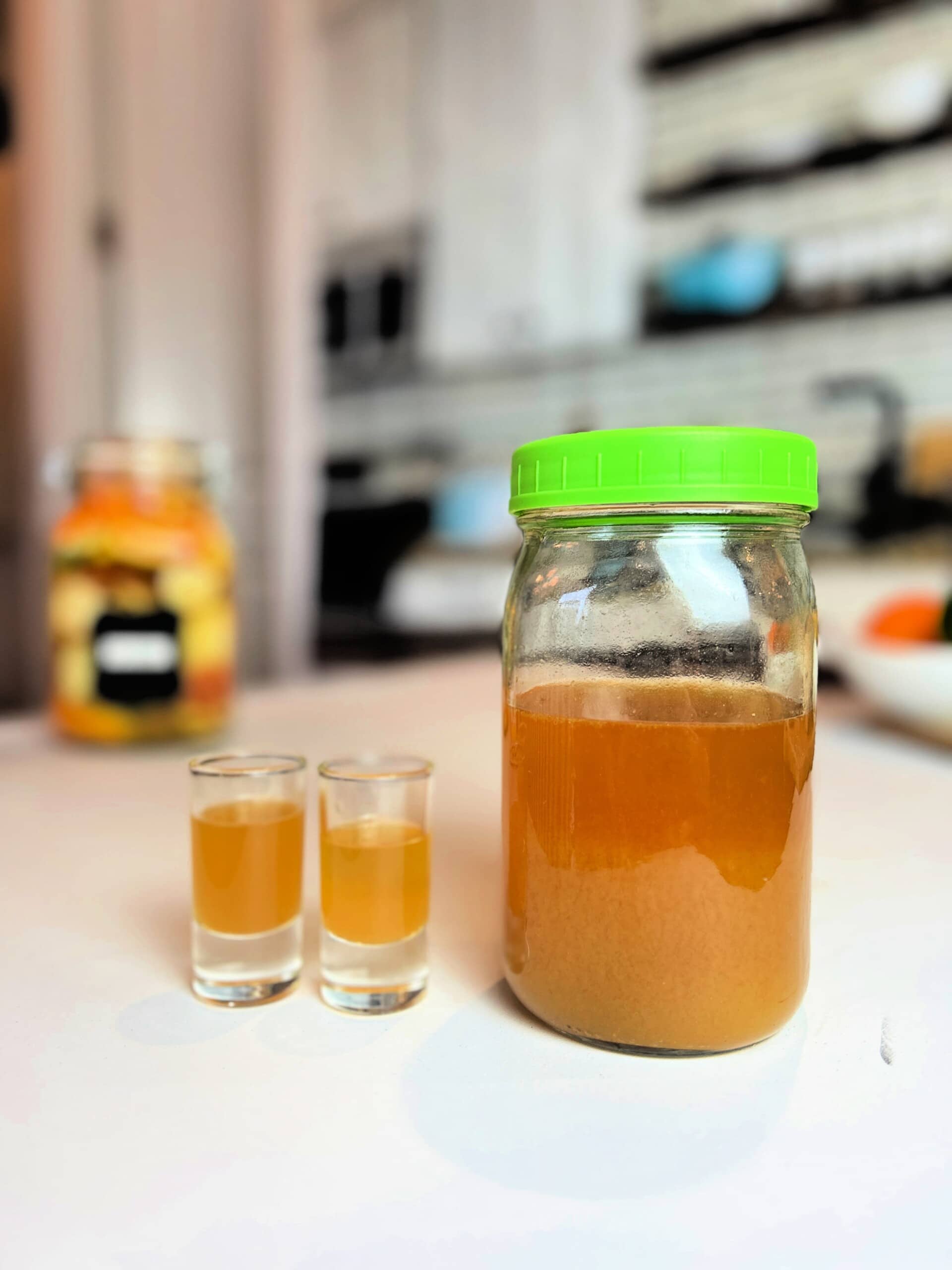
Fire cider can be taken by the spoonful, as a shot, with honey or pickle juice, added to hot water as a tea, used in salad dressings, marinades, or incorporated into various recipes for a spicy kick.
Absolutely! You can mix and match fire cider ingredients according to what you have on hand. It’s also a great way to use up some leftover onions, garlic or citrus that may be going bad soon, so definitely make it your own as this is more of a method than an exact recipe.
Properly stored in a cool, dark place, fire cider can last for several months. Refrigeration can extend its shelf life, but flavors may continue to develop over time and it could become too potent.
I hope all of you make a batch of this natural remedy to ward off any potential bad guys who always seem to take us down at the worst possible time. It’s great to have on hand over the holidays, cold & flu season, before and after traveling, any time you start to feel that dreaded itch in your throat, or just as a daily regimen to keep your immune system strong and ready to deal with whatever comes its way! Stay healthy friends! 🙂

Fire Cider Recipe
Ingredients
- 5 oz fresh ginger root sliced or chopped
- 3 oz fresh turmeric root sliced or chopped
- 5 oz horseradish root sliced or chopped
- 1 lime
- 2 lemons
- 1 orange
- 1 large onion
- 1 head garlic
- 1 jalapeno pepper
- 1 habanero pepper
- few sprigs fresh rosemary
- few sprigs fresh thyme
- few sprigs fresh oregano
- 2 cinnamon sticks
- 2-3 star anise
- 6-8 whole cloves
- 10 whole black peppercorns
- 3 cups organic raw apple cider vinegar with the mother
- raw manuka honey for serving, optional (or any raw honey)
- pickle juice for serving, optional
Instructions
- Start with a very clean 32 oz mason jar with a rubber or plastic lid. Alternatively you can use 2 quart size jars or 4 pint size jars.
- Slice or chop all fruits and vegetables and place in the jar, packing tightly.
- Add in herbs and spices. Jar should be very packed. If not, add in more fruits or vegetables.
- Pour in the apple cider vinegar until it reaches the top of the jar and covers all ingredients. Seal the jar tightly with a rubber or plastic lid.
- Shake the jar well to mix the ingredients. Store the jar in a cool, dark place for about 4-6 weeks. Remember to shake the jar every day to encourage the infusion of flavors.
- After the fermentation period, strain the liquid through a fine mesh sieve or cheesecloth into a clean bowl or another jar, separating the liquid from the solids. Discard the solids and store in tightly sealed jars or airtight containers in the refrigerator.
- Serve as a shot with raw Manuka honey or pickle juice, if desired. Take 2-3 shots per day as needed.




